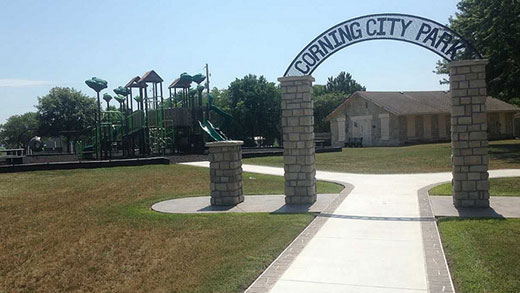
The city park at Corning is one site of recent improvements in the community. | Download this photo.
Kansas Profile – Now That’s Rural: Corning, Kansas
August 15, 2018
By Ron Wilson, director of the Huck Boyd National Institute for Rural Development at Kansas State University.
“One big family.” That’s a phrase which has been used to describe the community of Corning. The people of this community seem to be able to come together to work on community improvements and get things done.
Corning is a community in Nemaha County in northeastern Kansas. Roger Haug and his sisters Diane and Janice grew up on a farm near Corning. Roger is a farmer, mail carrier, longtime softball coach, and was recently named a Civic Health Hero by the Kansas Health Foundation. However, he really wanted to share the positive things happening in his hometown of Corning.
Roger’s friend Joe Roanoke wrote about Corning, in part: “I remember when my wife and I were two of the young people in town. Since the 70’s, we’ve watched the circle of life continue as young couples with past ties return to live and raise their families in Corning. Now, my wife and I are some of the oldest in town. The transition has been incredible.”
He pointed to the remarkable improvements which have taken place in the community. “Over the years, the Corning family has come together to install a completely new city water system, build a new city community center complete with a city library and medical clinic, create a beautiful new city park where the high school once stood, construct a new and all-important fire station, install a helipad for emergency Lifestar transport, begin a three-phase ballpark renovation including new concessions, bleachers, field and lights, not to mention a Corning community corn patch with donated land, seed, and labor,” Joe wrote.
Some of these community improvements were built through Kansas Department of Commerce Kan-Step grants, where the state pays for design and supplies while the community provides volunteer labor.
Housing is another positive. “New housing is the norm in this clean and friendly oasis,” Joe wrote. St. Patrick’s Church is also raising funds to build a new gathering center.
Citizens in a rural community tend to pull together in times of crisis. When one local family lost a child who died suddenly, Corning got behind a local biannual blood drive in her honor. The Ava Louise Steinlage blood drives began in 2011 and have collected approximately 1,400 units of whole blood. Staff members at the Community Blood Center commented that they have been amazed at how well such a small community can support such a good cause.
They’ve noticed two other things about the blood drive: One, the community provides an amazing number of treats and food for the participants, and two, people who give blood tend to stick around and visit because the town is so friendly and close-knit.
Much small-town community life revolves around sports. For years, Corning hosted what was considered one of the best slow pitch softball tournaments in Kansas. On summer nights, the citizens still gather around the ballfields for ballgames and conversation.
There is an annual community celebration called Cornstock – which might be spelled Cornstalk, except that it is a take-off on the Woodstock celebration of the 1970s. Today, Cornstock celebrates the community with games and competitions.
“The event is drawing people back to Corning for a weekend where kids can run free in the park without constant supervision of worrying parents,” Joe Roanoke wrote. “The small town atmosphere where the one big Corning family watches out for everyone is so compelling, relaxing and friendly, it is drawing bigger numbers every year.”
It’s a remarkable record for a rural community the size of Corning, population 206 people. Now, that’s rural.
How does such a rural community succeed? “I believe the bottom line is family,” Joe wrote. “Corning is a hardworking farming community with a strong sense of pride and ethics, always bent on doing things the right way. It has a willingness to come together to form one big family to get the job done.”
One big family. We commend Roger Haug, Joe Roanoke, the Steinlage family and all those who are making a difference with family values in Corning. They demonstrate that Corning is a can-do community.
Audio and text files of Kansas Profiles are available at http://www.kansasprofile.com. For more information about the Huck Boyd Institute, interested persons can visit http://www.huckboydinstitute.org.
----------------
The mission of the Huck Boyd National Institute for Rural Development is to enhance rural development by helping rural people help themselves. The Kansas Profile radio series and columns are produced with assistance from the K-State Research and Extension Department of Communications News Media Services unit. A photo of Ron Wilson is available at http://www.ksre.ksu.edu/news/sty/RonWilson.htm. Audio and text files of Kansas Profiles are available at http://www.kansasprofile.com. For more information about the Huck Boyd Institute, interested persons can visit http://www.huckboydinstitute.org.

